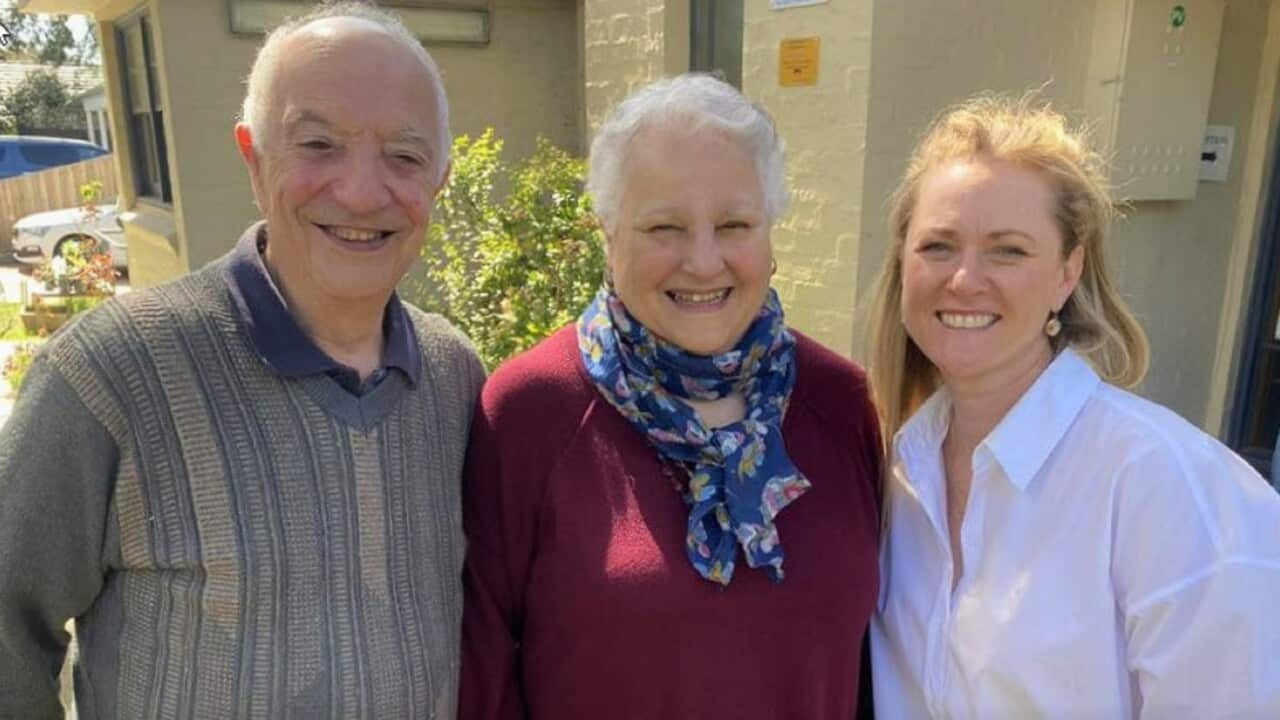TRANSCRIPT
Bob Dimattina is among 400,000 people in Australia living with dementia, a broad term for symptoms caused by disorders affecting the brain.
Mr Dimattina’s wife Grace is caring for her husband.
"He's still the same kind, gentle, sweet man that I married. Now he doesn't remember from one minute to the next and he's always losing his car keys."
Mr Dimattina is 82 and was diagnosed ten years ago.
His wife says it's heartbreaking to watch her husband of 59 years slip away.
"It comes on slowly and it is frightening at first when you first realise that the person you love can't quite remember things. I get sad when I think of what he was able to do and what he can't do now. And sometimes I even get a bit angry with the situation. And I feel as if I'm losing him a little bit at a time, I am losing him."
And that’s where dementia cafes step in.
The global movement helps people living with dementia to keep up an active social life.
Ms Dimattina explains.
"I think it helps him, helps him a lot. It is very relaxing, very relaxing for both of us and we just feel very comfortable. We're in a family. We can just be ourselves and I don't have to worry about if Bob says something cracks a joke that nobody gets. We're very happy here.''
Born into a large Italian migrant family, Mr Dimattina spent 11 years working in at Melbourne’s Victoria Market and memories of that time remain vivid.
"It was just hard work that's all. Midnight starts sometimes and you can get home to three o'clock in the afternoon and it's very hard when you do a physical, you really drained by the time you get home."
Ms Dimattina says everyday activities like shopping, going for lunch or visiting a public bathroom can be complicated.
"Things like being able to pick me out in a crowd. He can't do it, he panics and I could see the panic in his eyes. So yeah, unless you've got someone that suffers from it and you can see that happening to them, you've got no idea."
By 2058, dementia diagnoses are projected to reach 800-thousand - when 20 per cent of Australia’s total population will be aged over 60.
One in six people would then need specialist dementia support.
Improving quality of life is one reason registered nurse Kirsty Porter decided seven years ago to start Umbrella Dementia Cafes.
The social enterprise supports people living with dementia and their carers.
"It creates a lot of fun and laughter, and that's the goal here. Dementia cafes are so important for people, to boost their self-esteem, have a place where they can socialise, feel a sense of belonging, and it also reduces the detrimental effects of isolation."
Playing games and sharing memories helps to keep people living with dementia young at heart.
So says Liz Behjat from the Aged and Community Care Providers Association.
"Dementia's not an illness where you need to be locked away from society. You need to be out there in the open. You're still part of society and you actually need to be enjoying life. One of the roles for the dementia cafes is to be like a one-stop shop. So not only are you having some therapy and socialisation whilst you're at the cafe, but you can also pick up on some vital information."
Already more than one-point-five million people are involved in caring for someone living with dementia.
Liz Behjat says that burden of care is set to grow exponentially.
"Dementia is the biggest health issue facing people aged 65 and over in Australia today. We are an ageing population. We are living much longer. So that's what's happening now is the acuity of illnesses that we're taking into old age with us, are becoming more apparent."
In Australia, 14-and-a-half thousand people die each year from dementia.
Professor Sonja Pedell is Director of the Swinburne Living Lab, at Swinburne University of Technology in Melbourne.
"Dementia cafes are incredibly important because society still doesn't understand dementia very well and hence it doesn't offer very many opportunities for families affected by dementia. It can't be that people being diagnosed with dementia are too scared for months to tell anyone or avoid a diagnosis in the first place. It's so important that they know there is help at hand."
For Grace Dimattina, staying connected through a dementia cafe helps to make the most of whatever time the couple has left.
"We can relax in each other's company and never feel judged. You get here, everyone's laughing, everyone's chatting and they make a fuss of you: ‘Hello Grace, how are you Bob’? And you can't be depressed, you can't be sad when people are so great to you and so happy to you. So, your mood automatically shifts and gets better."













